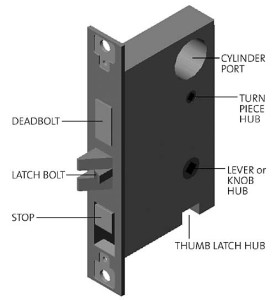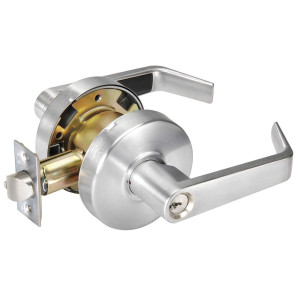One of the main questions we get by anyone new to the door and lock industry is the difference between a mortise lock and a cylindrical lock. Not everyone understands the different types of locks and their applications. It’s not uncommon when we’re performing a specification analysis with our customers that we hear, “Wait… Mortise? Cylindrical? What’s the difference?”
In all actuality, there’s a huge difference.
Mortise Lock
A mortise lock is a lock that requires a pocket, which is the “mortise” in “mortise lock,” to be cut into the door where the lock is to be fitted. Mortise locks are very common in commercial construction. 
There are several parts that are included in a typical mortise lock installation.
- First, there’s the actual lock body, and this is the part installed inside the mortise cut out in the door.
- Next is the lock trim. The trim can be selected from a large number of designs of levers, handle sets and pulls.
- The strike plate is also involved and this reinforces the holes placed in the frame for the latch or deadbolt to extend into.
- Finally, there’s a keyed cylinder which operates the locking function of the lock body.
Mortise locks are generally more complex and require more complicated manufacturing, installation and maintenance than cylindrical locks.
Cylindrical Lock
A cylindrical lock is designed to be installed through the door. This is what you are probably used to seeing if you’ve ever changed out a lockset at home. They will have a knob or a lever on either side of the door and this is what will retract the latch when turned or depressed.
 With a cylindrical lock, you’re going to get a relatively quick installation. Two holes are drilled through the face of the door for the lock chassis. Cylindrical locks don’t have any sort of mortise or pocket to be drilled or chiseled out so that’s going to save you quite a bit of installation time. These locks are much more common in homes, offices and interior doors.
With a cylindrical lock, you’re going to get a relatively quick installation. Two holes are drilled through the face of the door for the lock chassis. Cylindrical locks don’t have any sort of mortise or pocket to be drilled or chiseled out so that’s going to save you quite a bit of installation time. These locks are much more common in homes, offices and interior doors.
Cylindrical locks don’t require any sort of high-tech tools or a particular skill to install or replace. Most doors come pre-drilled, ready for hardware.
Whether a cylindrical or mortise lock works best for your facility, it’s important to know the basics before making a decision.

This is a great post, as far as it goes. Though it describes each of the lockset types, the basic question remains unanswered: why (or where) would I use one type over the other. While you do mention the lesser cost of cylindrical lock sets, there must be some sort of value to spending more for the mortise lock sets. I would love to see discussion, and maybe a checklist, of the criteria for choosing one type over the other. Thanks for the basic information, and I look forward to more.
Thanks for the comment – you just gave me great inspiration for my next lock-related blog post! I’ll post the link to the new article in this comment thread as soon as it goes live in the next few weeks.